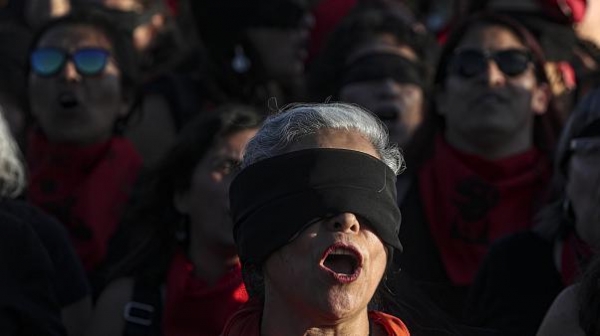
Women perform "A Rapist In Your Path," in a demonstration against gender-based violence in Santiago, Chile
– Copyright AP Photo/Esteban Felix – Esteban Felix
“And the fault wasn’t mine, not where I was, not how I dressed. You are the rapist.”
These chilling lyrics sung by thousands of Chilean feminists in protest against sexism and sexual violence have taken the internet by storm in the last few weeks.
“Un Violador En Tu Camino” is a Chilean feminist anthem also known with the English title “A Rapist In Your Path”. From its native Chile all the way to Australia, women all over the globe have interpreted the song and its accompanying dance, and hundreds of internet users have uploaded to the web and shared on social media videos of the performances.
How “A Rapist In Your Path” came to be
Created in Chile by the local feminist collective Las Tesis, the anthem was first performed during a flash mob in the country’s northwestern city of Valparaíso, about 120 kilometres northwest of the capital Santiago, on 20 November.
A few days later, on International Day for the Elimination of Violence Against Women, large groups of women gathered outside the Supreme Court of Chile, in Santiago, and near other government buildings across the country and staged it again.
Standing in line, dressed in party clothes and wearing blindfolds, protesters pointed their fingers at “the cops, the judges, the state, the president”, and chanted in unison a powerful battle hymn that accuses the patriarchy of being responsible for the violence committed against women, and the subsequent victim-shaming women face from society.
In just over two weeks the chorus spread out of the country, and similar demonstrations were held not only in Mexico, Costa Rica, Colombia and Argentina, but also in Canada, Australia as well as in European nations like France, Germany and Spain.
The lyrics were even translated into Spanish sign language to enhance the inclusiveness of the song and push its message even further.
Club America’s reaction to “A Rapist In Your Path”
Mexican women joined the protest against violence against women on 29 November, demonstrating in Mexico City’s main square against chauvinism and femicides. On 7 December, they took to the streets once again, after a video of the under-17 team of Mexico City football Club America mocking “A Rapist In Your Path” surfaced on the Internet.
The footage shows several shirtless players in a locker room, laughing and performing a loose, unsynchronised version of the anthem’s choreography.
Protesters angered by the team’s disrespectful behaviour demanded an apology from Club America, which responded by opening an investigation and threatening the young players with disciplinary measures.
Violence against women in figures
These kind of displays against male chauvinism come as an answer to the high number of femicides in Central and South America. According to data collected by the Gender Equality Observatory for Latin America and the Caribbean (GEO) of the United Nations Economic Commission for Latin America and the Caribbean (ECLAC), at least 3,529 women were killed for gender-based reasons in 25 Latin American and Caribbean countries in 2018.
The ECLAC report shows that four of the five highest rates of femicide in the Latin American region occur in northern Central American countries, namely El Salvador, Honduras and Guatemala, and in the Dominican Republic.
Whereas Peru has the lowest figure in the region last year, Bolivia has the third-highest rate in Latin America and the highest in South America.
“The gender-based killing of women is the extreme on a continuum of violence that women in the region experience,” said Alicia Bárcena, ECLAC’s regional organization’s Executive Secretary.
The United Nations official stressed that the figures compiled by ECLAC “show the depth of the patriarchal, discriminatory and violent cultural patterns that are present in the region.”
She continued: “Millions of women in the region have taken to the streets to assert and demand something so basic which is violated: the right to live violence-free lives.”
